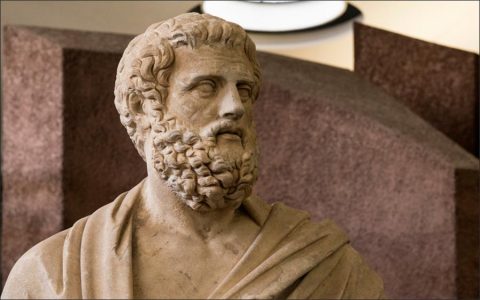Sophocles was born at Colonus, near Athens, in 496 B. C. At the age of sixteen he was chosen, for his beauty, to lead the choir of boys at the celebration of Salamis. When twenty-eight, he produced tragedies for the first time and won the prize against Aeschylus. Throughout his long life he worked with great public success at tragic composition, winning either first or second prize eighteen times. Sophocles took some part in public affairs also, serving twice as a general. He died in 406 B. C., and was revered by his countrymen as a ‘hero’.
The interest to be found in Sophocles passes beyond the domain of drama. One cannot but be thrilled by the thought that once in the history of our race there has been a man who ‘had everything’; it is impossible to think of any source of happiness which was not possessed by Sophocles. We can form a more concrete notion of his personality than of any other fifth-century Greek.
His social charm, joined to his vast poetical and dramatic powers, enabled him to gather a salon, and from Ion’s Memoirs we gain some idea of the talk in this circle. When the poet came to Chios, for instance, he engaged in a dispute with the local schoolmaster about poetical adjectives. He was a friend of Herodotus, for whom he wrote a poem, and whom he quotes several times. Two important remarks of his survive. ‘I depict men as they ought to be, Euripides depicts them as they are.’ ‘My dramatic wild oats were imitation of Aeschylus’s pomp; then I evolved my own harsh mannerism; finally I embraced the best style, that most appropriate to the portrayal of human nature.’ He did great service to tragedy on the strictly technical side. In particular, be introduced scenepainting, added a third actor, and wrote tetralogies each play of which was quite independent of the others.
Antigone was produced in 441 B. C. It is difficult to say whether it is earlier or later than Ajax. The scene is laid before the palace at Thebes, on the morning after the repulse of the Argives and the fratricidal deaths of Polynices and Eteocles. King Creon orders that no one shall give burial to Polynices under pain of death. Antigone, sister of Polynices, sprinkles the ritual dust and is brought before Creon. She insists that his decree cannot override the unwritten laws of Heaven. Creon, disregarding the persuasions of his son Haemon, Antigone’s betrothed, sends her to be immured in a cave.
The prophet Tiresias announces that the gods resent the pollution caused by the unburied corpse. Creon gives way and hurries first to bury Polynices, then to release Antigone, who hangs herself before his arrival. Haemon stabs himself over her body, and Eurydice, Creon’s wife, learning of Haemon’s death, commits suicide.–This tragedy, beautiful but somewhat stiff in diction, character-drawing, and general conception, has two great features.
One is the magnificent odes: the first, rejoicing in the deliverance of Thebes; the beautiful lyric on the power of Love-Eros, unconquered in fight, whose path is over the sea, whose vigil is kept upon the eyes of a maid; and the famous song of Man and his all-embracing enterprise. The other is the conflict between the two duties set before Antigone. To suppose her right beyond question and Creon a stupid villain is to destroy the play. We must remember the well-nigh unbounded importance of the State for all Athenians. Antigone and the king are to be regarded as–roughly and in the first instance–equally right. Only by degrees is she justified.
The action of Ajax passes mostly before that hero’s tent on the Trojan plain. Athena explains to Odysseus that Ajax, enraged by the decision of the Greeks to bestow the arms of Achilles on Odysseus rather than Ajax, has sought to slay Agamemnon and others in their sleep; but Athena sent madness upon him so that he slaughtered cattle in their place. The chorus of sailors enter.
Ajax, now sane and brooding over his disgrace, talks with them and the Trojan captive Tecmessa, who has borne him a son. Answering their admonitions evasively, and bidding a covert farewell to the child, he retires to a lonely spot and falls upon his sword. Teucer, his brother, hurries in too late to save him, but confronts and defies Agamemnon and Menelaus, who have ordered that Ajax’s body shall not be buried. In the end Odysseus persuades Agamemnon. to yield.–Ajax is a superb study of essential greatness.
It matters not that he has (in purpose) committed an atrocious crime, and is only soured, not chastened, by his fall. He is conceived on great simple lines, and the poet’s marvellous art causes us to realize his grandeur despite his immense faults. Tecmessa is the normal woman raised to the height of moral loveliness by the poet’s expression of her tenderness and patience. ‘Nay, have remembrance even of me. If joy hath been wrought, should not a man hold memory thereof?’ Ajax dies at v. 865, and there are several hundred lines more filled by a fierce dispute about his burial. The explanation is, that the question of the play is not ‘What is to become of Ajax?’ but ‘What is to become of his repute? The suicide is only one step towards his final rehabilitation.
Electra has for its background the palace at Argos, whither Orestes returns, accompanied by Pylades and an old slave, to avenge Agamemnon upon Clytaemnestra. Chrysothemis, daughter of Agamemnon and sister of Electra, is sent by her mother to appease Agamemnon’s shade, but is persuaded by Electra to pray his help for the supposedly absent Orestes. The old slave brings a story that Orestes has been killed in a chariot-race, and the queen’s fears are allayed.
Chrysothemis returns to Electra, joyfully announcing the presence of Orestes, since she has seen a lock of his hair on the tomb. But Electra answers that he is dead; while she is mourning for him, Orestes himself brings an urn, pretending to be a stranger with the ashes of Orestes. Electra’s lamentation over it reveals to him who she is, and he makes himself known. The men go within and slay Clytaemnestra. Aegisthus arrives and, hearing from Electra that Orestes’ body has been brought home, triumphantly orders it to be carried forth.
When he uncovers it, he finds the corpse of Clytaemnestra, and is driven within to die.–This play should be compared with the Choephoroe of Aeschylus and the Electra of Euripides. Its chief features are: (i) the horror of the matricide does not disturb Sophocles, who refers the responsibility to the oracle which commanded it; (ii) the whole action is considered from the standpoint of Electra’s history and character; (iii) there is a marked ‘sense of the theatre’, to which we owe the magnificent lament over the urn, the considerable use made of Chrysothemis, and the coup de théatre when Aegisthus expects to see the dead face of Orestes.
The Oedipus Tyrannus is also of uncertain date. Thebes is ravaged by pestilence. Oedipus announces to his terrified people that he has already sent Creon, brother of his wife Jocasta, to consult the Delphic oracle. The response is brought that Thebes will be saved if purged of those who slew Laius, the former king. Oedipus is told that Laius was killed by robbers; one man only of his retinue escaped. He calls upon the slayer to declare himself, and pronounces excommunication against the unknown if he remains silent.
The chorus-leader suggests that Tiresias the seer be consulted; Oedipus replies that he has already been summoned. The other remarks that some say Laius was killed by travellers. Tiresias enters, but is so reluctant to discuss the mystery that Oedipus charges him with complicity. Tiresias accuses Oedipus of the murder, and the other in rage exclaims that Tiresias is plotting with Creon to make the latter king. The prophet threatens him with mysterious horrors and withdraws. Creon enters, dismayed by the charges of Oedipus, who quarrels bitterly with him till Jocasta half reconciles them.
Hearing of Tiresias’s accusation, she seeks to encourage him by a proof that soothsaying is untrustworthy. ‘An oracle came to Laius that he would be slain by a son of his and mine. But he was killed at a place where three roads met; and the child, not three days old, was cast out upon a mountain, his ankles fastened together. The phrase ‘where three roads met’ fills Oedipus with alarm. The answers to his questions deepen his dismay, and he sends for the single survivor. Then he tells Jocasta his story. He is the son of Polybus, king of Corinth, and was told at Delphi that he would kill his father and marry his mother. He cheated the oracle by never seeing his parents again.
Later he met a party such as Jocasta. has described, and in a quarrel slew them all. Apparently he is the slayer of Laius; his only hope lies in the survivor who spoke of robbers in the plural. Soon a Corinthian enters, announcing that Polybus is dead. Jocasta points out that Polybus was the man whom Oedipus feared he must slay. She mocks at the oracle, but he points out that his mother still lives. The messenger intervenes: ‘But you are not the son of Polybus and Merope.’
He explains that he himself gave Oedipus when a babe to Polybus. The child was found in the glens of Cithaeron with an iron thrust through his ankles. The Corinthian does not know–who did this, but the man from whom he received the babe may know–another herdsman, of Laius’s household. It now appears that this second herdsman is the person summoned earlier. Jocasta breaks into a cry of agony and rushes within. The aged servant of Laius approaches, and the truth at length comes to light: Oedipus is the son of Laius and Jocasta. He rushes into the palace, finds that Jocasta has hanged herself, and destroys his own eyes. After a while the stricken man reappears, but Creon enters and bids him hide in the palace. Oedipus prays to be cast forth upon Cithaeron again, but Creon replies that the oracle must be consulted. Oedipus bids farewell to his little daughters, and all go within.
This tragedy may be set beside Macbeth and Hedda Gabler as an example of superb construction–not merely consummate skill in mechanism (that may be seen equally well in Jonson’s Volpone), but construction produced by, illustrating, and causing the emotions, authentic and engrossing, of the several characters. In particular, the action is pivoted upon Oedipus: were his soul, his temperament, even his manner, changed but slightly, the plot could not proceed as it does. Yet there is nothing factitious about him: dignified, kindly, patriotic, hot-tempered, spiritually brave, not for a moment does he allow us to feel that he is being manipulated by the playwright.
The Trachiniae or Women of Trachis is laid before the house of Heracles in Trachis. Deianira, his wife, is distressed by his absence, since an oracle has said that this his last enterprise will bring him either death or peace. Their son Hyllus departs to aid him in his attack on the city of Eurytus in Euboea. Lichas enters, telling of Heracles’ victory and bringing the captive Iole, beloved by Heracles.
Deianira elicits this last fact from Lichas, and to win her husband back sends a gift–a robe anointed with the blood of the centaur Nessus as a love-charm. Later she discovers that the charm was deadly poison. Next Hyllus returns with news that his father is dying in torment, and Deianira stabs herself, after which Hyllus learns the truth; and when Heracles is carried in, cursing Deianira, Hyllus explains her error. Heracles commands that his, body be burnt on Mount Oeta and that Hyllus marry Iole.–The central figure and informing spirit of this tragedy is Deianira. The action shows how she does in fact bring back her husband and triumph over his later love. Her nature, despite all the sorrow and destruction, is marvellously appealing, strong, and gracious. Much of her power lies in quiet disillusionment, as when she says of Iole:
The flower of her age is in its spring, But mine in autumn; and the eyes of men Still pluck the blossom, shunning withered charms.
Philoctetes was produced in 409 B.C. The scene is laid before the cave of Philoctetes on the desolate island of Lemnos. The Greeks on their way to Troy marooned Philoctetes here because, stung in the foot by a snake, he troubled them with his cries and the odour of his incurable wound. But now Odysseus and the young Neoptolemus have been sent to fetch him, since Troy can be captured only by help of Philoctetes and the bow which Heracles bequeathed him.
Their great obstacle is Philoctetes’ bitter resentment against the Greeks. Neoptolemus wins the sufferer’s confidence, while Odysseus keeps in the background and helps the plot by sending a false message. When the bow is secured and Philoctetes is about to accompany Neoptolemus–back to his home, as he thinks–the youth tells him their real destination. Philoctetes’ reproaches win Neoptolemus and, defying Odysseus, he promises to convey Philoctetes home. At the last moment Heracles appears in the sky and bids his old comrade seek Troy.
He consents, and bids farewell to the scene of his ten years’ wretchedness.–Though not the greatest play of Sophocles, this is in several respects the most interesting. For the first time the fullest possible use is made of the three actors. There is a magnificent picture of Philoctetes’ life amid the animals, birds, and desolate landscape of his island-home. Odysseus’s craftiness produces a masterpiece of intrigue. The ingenuous spirit of Neoptolemus is beautifully studied.
Sophocles stands at the zenith of the Attic spirit. His Greek is a miraculous blend of beauty, simplicity, flexible ease, and a faintly fastidious dignity. On the dramatic side the chief note of his manner is that he loves to depict a great character governed by some one tremendous emotional appeal and creating drama by its loyalty thereto. Beside the hero is regularly found a secondary person, of smaller stature but possessing practical sagacity, who in the hour of ruin takes command of the situation–for example Creon in the Oedipus Tyrannus, Theseus in the Coloneus.
Visits: 403



